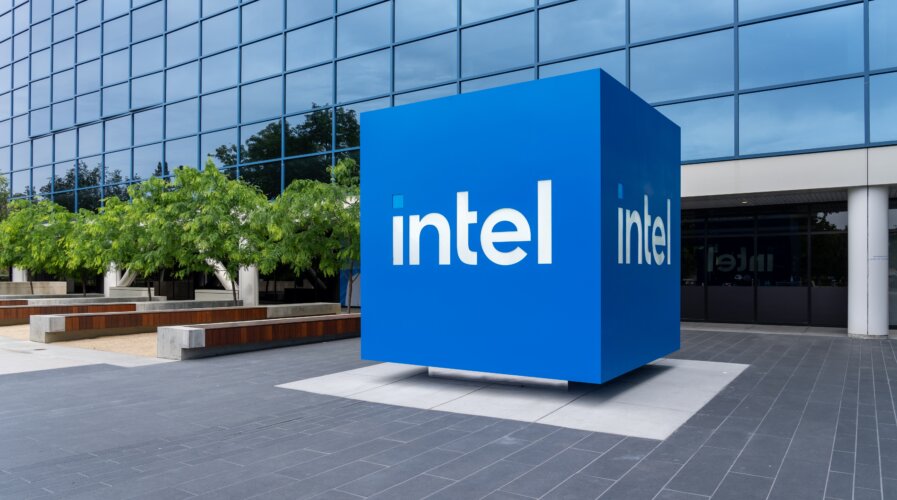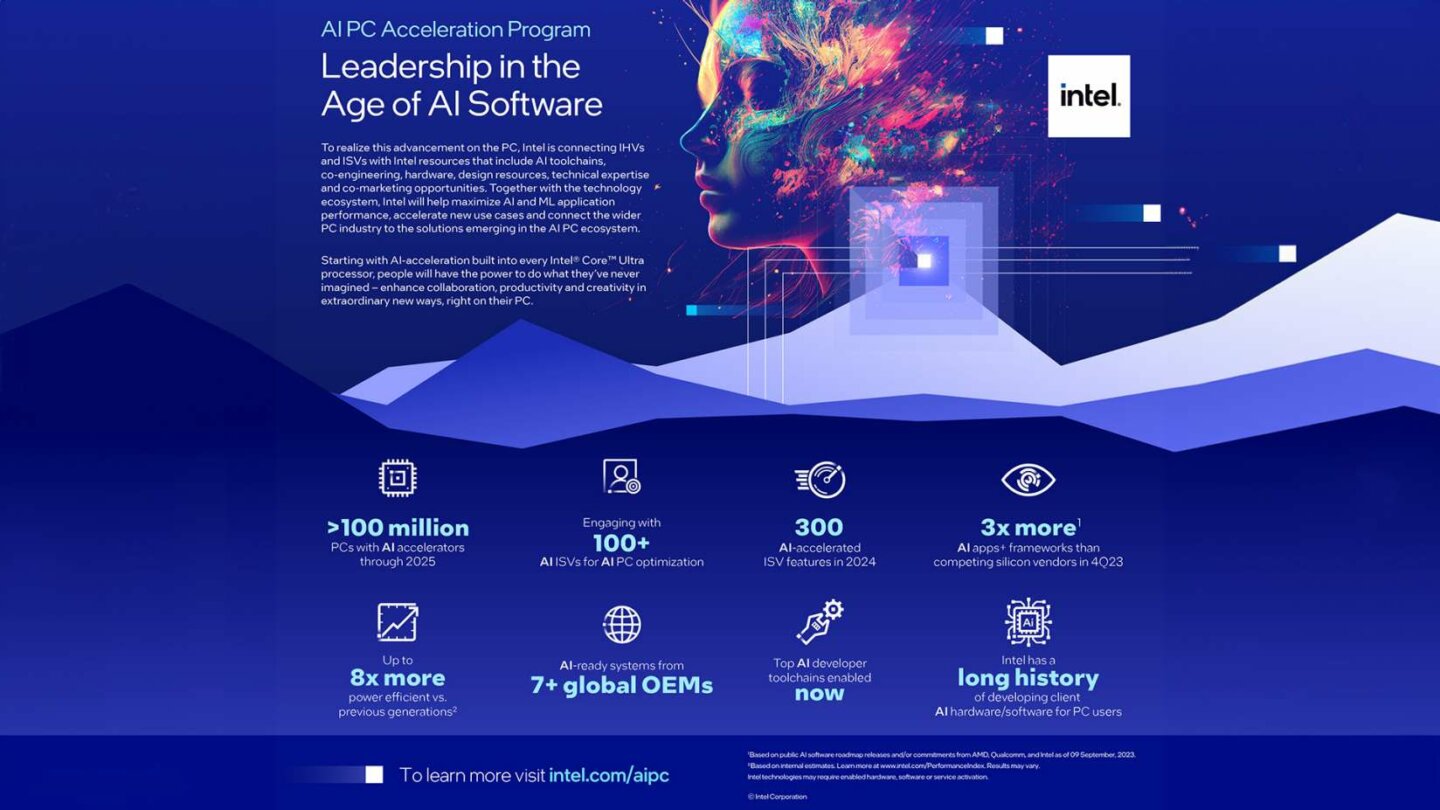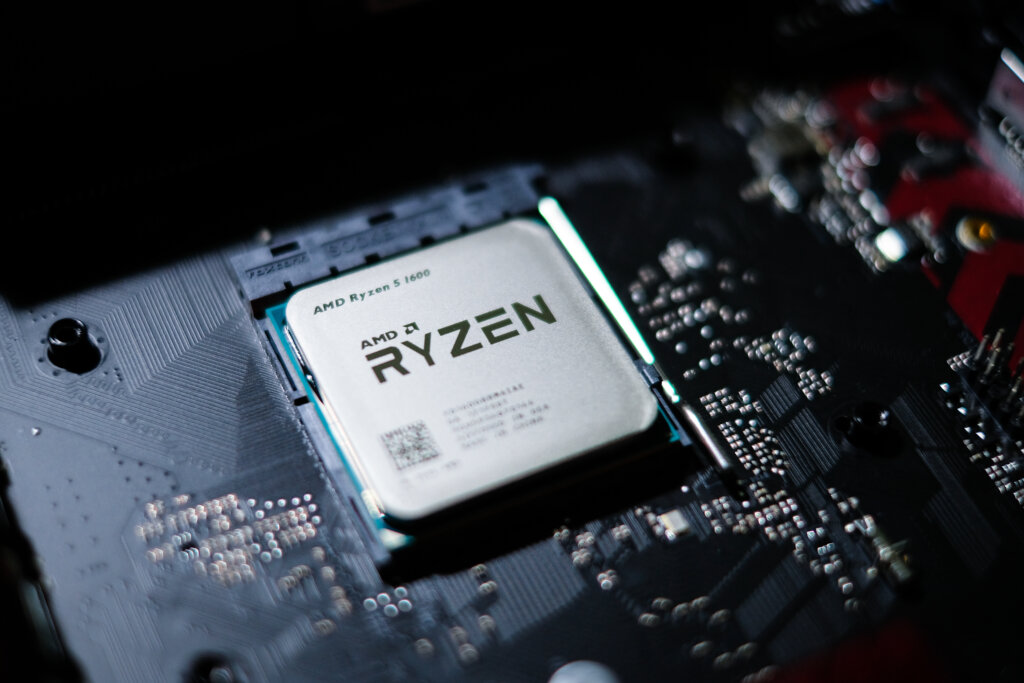
Intel launches the industry’s first AI PC Acceleration Programme. (image by Shutterstock)
Intel releases the industry’s first AI PC Acceleration Program
- Intel aims to activate AI on over 100 million PCs by 2025 with its AI PC Acceleration Program.
- The Program is anchored by the forthcoming Intel Core Ultra processors.
- Partnering with 100+ ISVs, Intel plans to boost PC functionalities across multiple sectors, leveraging 300+ AI-driven features.
Intel is no stranger when it comes to AI, actively targeting the promising prospects it offers.
Foreseeing a future where the upcoming generation of personal computers will have the innate ability to execute AI inference operations, Intel is aligning its strategies to make this vision a reality. An executive from Dell Technologies has anticipated the arrival of AI-enabled laptops by 2024, a development Intel is keen on catalyzing.
The competition is heating up in the arena of supplying chips essential for the development and inference of substantial AI language models. Nvidia has established a stronghold in the GPU market, a critical component in data centers for advancing AI models.
But Intel and the freshly public Arm are spotting avenues where CPUs can execute AI inference tasks directly on portable devices like laptops and smartphones, considering that Nvidia’s premium GPUs are not viable for personal computing due to their size and cost.
Integrating AI capabilities directly into laptops could pivot the entire PC industry, letting users operate generative AI programs natively, and eliminating the need for continuous cloud connectivity.
Despite these advancements, predicting the PC’s future landscape remains challenging, especially with AI’s disruptive emergence, as highlighted by industry experts.
Recent forecasts by analyst group IDC anticipate a resurgence in demand for PCs by 2024, following a lull after the pandemic. This projection aligns with Gartner’s analysis and seems plausible considering the impending end of support for Windows 10 in 2025, prompting widespread system updates across IT departments.

Intel announces industry’s first AI PC Acceleration Program. (Source – Intel)
How AI is reshaping the PC landscape
However, IDC underscores the complications brought on by the burgeoning field of generative AI. The report indicates a sense of uncertainty among IT decision-makers regarding budget allocations. Furthermore, a transformative wave seems imminent for the traditional PC, allowing it to handle certain AI operations dependent on cloud connectivity. It is a critical enhancement for real-time gaming or language translation applications.
IDC’s experts concur, noting, “While AI-capable PCs are not ready today, they are coming, and have shifted some of the discussion around device purchasing within businesses.”
In a noteworthy twist, IDC’s findings also reveal increasing market shares for AMD and Apple in the PC processor realm, capturing 11% and 5% in the previous year. This trend could signal one of the most significant market shifts in the history of commercial PCs.

AMD is getting increasing market share. (Source – Shutterstock)
In light of these developments, Intel announced the launch of the AI PC Acceleration Program at Innovation 2023. This global initiative is intended to expedite AI advancements throughout the PC sector.
Unveiling the AI PC Acceleration Program
The program is designed to connect independent hardware and software vendors to an array of Intel resources, including AI toolchains, co-engineering, hardware, design expertise, technical support, and co-marketing prospects. These provisions are set to assist the community in leveraging the full potential of Intel Core Ultra processor technologies and related hardware, optimizing AI and ML application efficiency, hastening the development of new applications, and bridging the broader PC industry with emerging solutions within the AI PC domain.
The dawning of the AI PC era symbolizes a pivotal moment in the PC industry, characterized by a growing suite of software augmented by AI and ML protocols. Such applications are revolutionizing how individuals engage in creative endeavors, compile information, and enhance productivity.
Intel is leading this shift, offering potent architectures for CPUs, GPUs, and NPUs, fine-tuning AI programs’ functionality and energy efficacy.

Intel’s CEO, Pat Gelsinger, tweeted that Intel’s plan is to bring AI everywhere. (Source – X)
Intel’s vision: ushering in the age of AI PCs
Michelle Johnston Holthaus, executive vice president and general manager of the Client Computing Group at Intel, said that Intel understands the crucial role of software prowess in defining the AI PC user experience and is poised to guide the sector through its inclusive ecosystem strategy.
“With a long history in AI development and a deep network of ISV engineering relationships, Intel will take an active role in fostering connections and innovations that propel new use cases and experiences on the PC,” Holthaus added.
The AI PC Acceleration Program pledges to offer ISVs direct access to Intel’s extensive array of engineering professionals for bespoke software refinement and adjustments, essential development instruments, and SDKs such as OpenVINO, alongside lucrative market entry opportunities.
By collaborating with over 100 ISVs on upwards of 300 AI-boosted functionalities – encompassing names like Adobe, Audacity, BlackMagic, BufferZone, CyberLink, DeepRender, Fortemedia, MAGIX, Rewind AI, Skylum, Topaz, VideoCom, Webex, Wondershare Filmora, XSplit, and Zoom – Intel aims to augment user experiences in diverse domains including audio enhancements, content generation, gaming, cybersecurity, live streaming, video conferencing, and beyond.
The AI PC Acceleration Program serves as a continuation of the Intel Partner Alliance’s AI Accelerator Initiative, offering a structured collaborative method for over 1,000 ISV partners. This approach facilitates the development, refinement, and implementation of AI solutions, spanning from edge computing to cloud services.
READ MORE
- 3 Steps to Successfully Automate Copilot for Microsoft 365 Implementation
- Trustworthy AI – the Promise of Enterprise-Friendly Generative Machine Learning with Dell and NVIDIA
- Strategies for Democratizing GenAI
- The criticality of endpoint management in cybersecurity and operations
- Ethical AI: The renewed importance of safeguarding data and customer privacy in Generative AI applications




